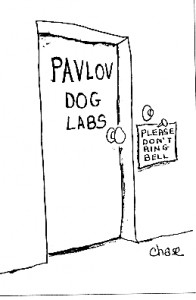Saving Your Marriage: What Does Pavlov Have To Do With It?
https://savethemarriage.com/stmblog/wp-content/themes/corpus/images/empty/thumbnail.jpg 150 150 Lee H. Baucom, Ph.D. Lee H. Baucom, Ph.D. https://secure.gravatar.com/avatar/669b7e375d93f77521ddaba08adb8063?s=96&d=blank&r=pgRemember Pavlov and his dog? In this famous experiment, Ivan Pavlov would ring a bell and then feed his dog. He repeated this process over and over, and then he just rang the bell. No food. Remember the dog’s response? He still expected the food and started salivating!
Ivan Pavlov would ring a bell and then feed his dog. He repeated this process over and over, and then he just rang the bell. No food. Remember the dog’s response? He still expected the food and started salivating!
We can all be clear that Fido was not sitting there thinking “dinner bell just rung, so here comes my dinner!” Yet that is exactly what his body was doing, getting ready for dinner.
Are we so different than the dog? Oh, sure, we can think in words, so we can do a little reasoning. But we are still creatures of conditioning. When we go to a movie, popcorn suddenly sounds good. When we hear the icecream truck, we start thinking about how good that icecream would taste (Talk about a business taking advantage of Pavlov’s research! Kids salivating at the ringing of a bell!), when we hear the angry tone in our spouse’s voice, our stomach tightens.
See how I dropped it in there? Indeed, Pavlov and his dog have a great deal to do with our marriage. And here, they have a good bit to do with our saving our marriage.
You see, we condition each other in a marriage. Over time, it is as if both of us are Pavlov, and each of us is the dog, simultaneously. At the same time I am being conditioned, I am conditioning.
**SIDE NOTE: if you are not familiar with the term “conditioning,” it is a term from psychology that talks about how a behavior is structured by a set of inputs. When I “condition” my dog to sit on command, I get him to sit, then reward him. First input, my command to sit. First response (hopefully), he sits. Second input, I reward him. Second response (if all has gone well), he learns that if he sits on command, he gets a treat!**
Now let me be very clear here. I am NOT calling your spouse a dog. I AM stating that we humans also respond to this “stimulus-response conditioning.” In fact, we have so much coming at us that we do many things on automatic, as we just can’t think through everything. So, our brain takes shortcuts. We learn a response, and we use it over and over. Sometimes, it is helpful. Sometimes, it is not.
Imagine for a moment that you are sitting at the table, working on the bills. In walks your spouse with what you interpret as a scowl on their face. Without really processing it, your brain notes that it has seen that look before, and things did not go well. So, trying to shortcut the problem, you say “what’s wrong with you?” What you might not notice is something your spouse noticed: a little edge in your voice. Ouch!
“Nothing is wrong. Why do you always assume something is wrong?” Already, you have been trying to figure out how to get the bills to fit into the money available, and already have some adrenaline running through your system. And that is all it takes. Each of you have a bit of fuel thrown onto your flames.
In seconds, a quiet afternoon erupts into a relational wildfire. And as both of you keep digging into your bag of learned tricks, you find more and more fuel to dump on the flames. Soon, every weakness, slight, and pain from the years of your relationship are heaped onto the table. And there seems little way out.
Sound familiar? Change the circumstances just a bit. Do they fit the pattern for you? Or perhaps you have followed that path so many times that you have another conditioned response: silence. Freezing silence to prevent the fire. It just doesn’t seem worth it anymore.
One of the things we humans do not like to admit is how much we work on automatic, how much we are conditioned to respond. We pretend that only animals are that easily influenced. Somehow, our higher capacity of thought is supposed to keep that from happening(!), but nothing is further from the truth! MUCH of our lives is run on a simple “stimulus-response” capacity.
So why not use that to your advantage? Why fight it? Instead, befriend conditioning and make it work FOR you!
First, consider what ALL the research shows: positive conditioning is MUCH more powerful than negative conditioning. In other words, if you want to try to use conditioning, reward the behavior you like. . . and ignore the behavior you don’t like. You see, when you give negative conditioning, you are still conditioning FOR the behavior.
Let’s think back to the toddler years. A child is walking through the aisles of the store, sees a toy he MUST have, and tries to get you to buy it. You refuse. He melts down, goes to the floor in tears, and wails as if he is on the edge of death. You:
a) grab that toy and buy it (positive conditioning for negative behavior),
b) grab that boy and drag him out of the store (negative conditioning for negative behavior, showing him that his fit DID get a response),
c) stare at him quietly, giving no cues to what you think, but giving him that slight “you look foolish, and it ain’t working” bemused look.
Outcome to a): he will throw a fit whenever he wants something. Outcome to b): he will throw a fit when he wants your attention. Outcome to c): he learns that the fit does not work, so he gives it up.
Application: when your spouse does something you like, let him/her know it, loud and clear! If your spouse does something you don’t like, as long as it falls short of abuse or danger, ignore it.
Back to the bill-writing episode of the spouse with the scowl. Why even respond? If something is wrong, isn’t it up to that person to address it, bring it to your attention? Otherwise, we are training our spouse that we will try to read their mind — a recipe for disaster!
Assume that, unless your spouse approaches you about what is behind that scowl, it is their issue. It is up to them to address, not up to you to discover. Let it go, and move on. Remember, you are conditioned, too. And you need to recondition yourself.
Second, notice when you are automatically reacting. Look for it. Here are some places to look:
a) when you are repeating the same arguments, and they start the same way,
b) when you find yourself wondering why your spouse is not responding to some action, expression, or tone you are using (maybe they read this first!).
c) when you feel your gut tightening, a sure sign that you are caught by some pattern.
Marriages do not suddenly fall apart. They are taken apart, brick by brick. Pattern after pattern, conditioned response after conditioned response, the foundation is taken apart. And marriages are not saved in an instant. They are rebuilt brick by brick. But the rebuilding starts when someone decides to stop acting on automatic.




